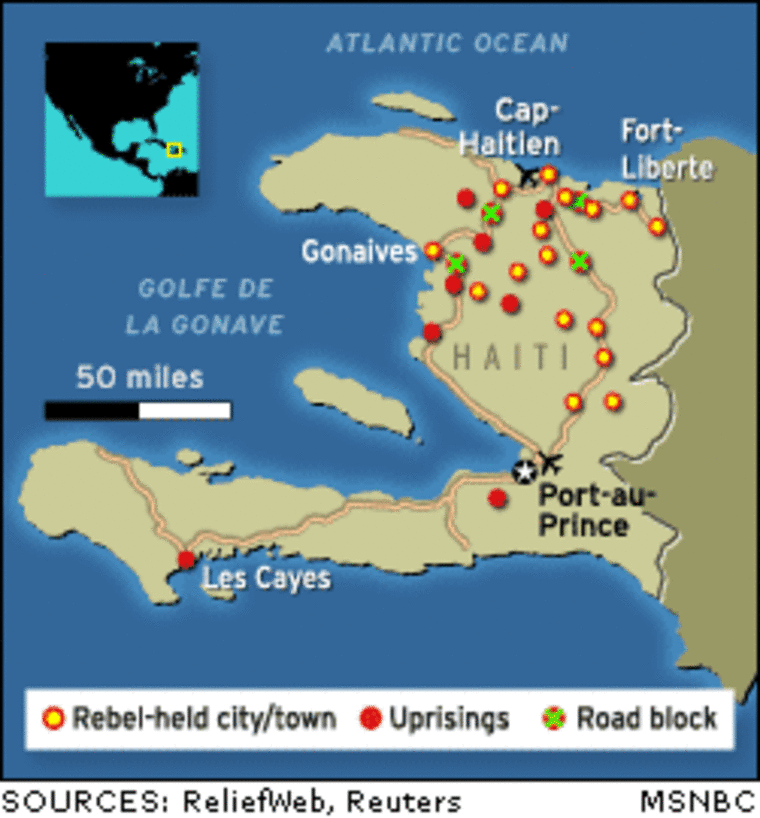With the capture of Haiti's second-largest city, Cap-Haitien, the Caribbean nation appears on the verge of a full-blown civil war. NBC's Kerry Sanders, on assignment in the nation's capital, discusses the implications for the hemisphere's most impoverished nation.
What is the mood on the ground?
There is a sense of tension here in the capital of Port-au-Prince. Folks recognize that there appears to be something on the horizon, but they can't say when. When you talk to people on the street and say 'Do you think something is going to happen?' They say, yeah, I got a feeling something is going to happen in the next two weeks - maybe even this week.
What are people's expectations?
Already people are talking about this as a civil war. Classically this would be described as an uprising right now. But with north now controlled by the rebel movement and the south still controlled by President Jean-Bertrand Aristide, I guess you could already call this a civil war.

The general sense I get from people that I've spoken to here is that they are going to fight this out. It doesn't appear that either side really wants to step down.
President Aristide has said repeatedly that he is going to remain in office until he completes his term in 2006, and those who want him out of power have said that they will do what they think is necessary to remove him.
The rebels have burned down police stations, chased police out of town, and have shot and killed those standing in their way.
Do Haitians feel the U.S. and France have abandoned them?
People recognize that the United States does have delegates here to effort a peace plan. President Aristide has implicated that an international presence will be necessary even if the rebels accept the proposed peace plan in order to disarm them.
What is the humanitarian situation?
The humanitarian situation is grave and getting worse. In the north, in Cap-Haitien, CARE has a large stockpile of food, but as the rebels have gained power, access to the supplies is dwindling.
Sandy Laurmark, the CARE Director in the area, told us there are only a few days worth of supplies left.
Laurmark fears that there will be innocent victims caught in the middle of the violence. She fears that mothers and children who rely on aid provided by CARE will not get what they need.
Many of the workers for CARE are local Haitians, so staffing is not an issue. The biggest concern is supplies. Many other humanitarian agencies have pulled their teams out of the country because of security concerns, leaving those who rely on them with nowhere to turn.
Is there a sense that non-violent opposition has influence?
Yes, there is a sense that they have influence. The non-violent opposition crosses all economic levels in Haiti. Group 184 has wide spread support and has disavowed any association with the violent opposition. Coordinator Andy Apaid said that he is studying the [U.S.-backed] peace plan closely. But, he says it has failed on the most important demand: that President Aristide step down.
Is there a sense that there will be a mass exodus to the U.S.?
There is no indication at this point of large boat building along the coast. No sign of residents climbing on boats to float to safety in the U.S. But, it is still early.
How dangerous is it on the ground?
There is real danger on the ground. Some journalists have been attacked. But, we [NBC] are wearing our helmets and our flak jackets. We have not been threatened at all. We hope to keep it that way.